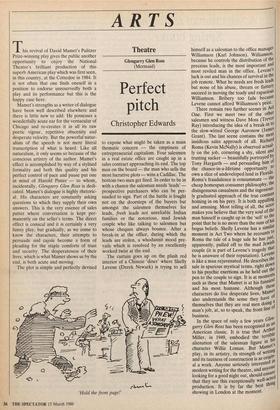ARTS
Theatre
Glengarry Glen Ross (Mermaid)
Perfect pitch
Christopher Edwards
This revival of David Mamet's Pulitzer Prize-winning play gives the public another opportunity to enjoy the National Theatre's brilliant production of this superb American play which was first seen, in this country, at the Cottesloe in 1984. It is not often that one finds oneself in a position to endorse unreservedly both a play and its performance but this is the happy case here.
Mamet's strengths as a writer of dialogue have been well described elsewhere and there is little new to add. He possesses a wonderfully acute ear for the vernacular of Chicago and re-creates it in all its raw poetic vigour, repetitive obscenity and desperate velocity. But the powerful natur- alism of the speech is not mere literal transcription of what is heard. Like all naturalism, it only seems so because of the conscious artistry of the author. Mamet's effect is accomplished by way of a stylised formality and both this quality and his perfect control of pace and pause put one in mind of Harold Pinter — to whom, incidentally, Glengarry Glen Ross is dedi- cated. Mamet's dialogue is highly rhetoric- al. His characters are constantly asking questions to which they supply their own answers. This is the very essence of sales patter where conversation is kept per- manently on the seller's terms. The direct effect is comical and it is certainly a very funny play, but gradually, as we come to know the characters, their attempts to persuade and cajole become a form of pleading for the staple comforts of trust and security. The desperateness of their lives, which is what Mamet shows us by the end, is both acute and moving.
The plot is simple and perfectly devised to expose what might be taken as a main thematic concern -- the emptiness of entrepreneurial capitalism. Four salesmen in a real estate office are caught up in a sales contract approaching its end. The top man on the board — the man who sells the most lucrative plots — wins a Cadillac. The bottom two men get fired. In order to be in with a chance the salesman needs 'leads' — prospective purchasers who can be per- suaded to sign. Part of the battle is fought not on the doorsteps of the buyers but amongst the salesmen themselves for leads, fresh leads not unreliable Indian families or the notorious, mad Jewish couple who like talking to salesmen but whose cheques always bounce. After a break-in at the office, during which the leads are stolen, a whodunnit mood pre- vails which is resolved by an excellently worked twist at the end.
The curtain goes up on the plush red interior of a Chinese 'diner' where Shelly Levene (Derek Newark) is trying to sell 'Hold the front page!'
himself as a salesman to the office manager Williamson (Karl Johnson). Williamson, because he controls the distribution of the precious leads, is the most important and most reviled man in the office. Levene 's luck is out and his chances of survival in the job remote. What he needs are fresh leads but none of his abuse, threats or flatterY succeed in moving the toady and rapacious Williamson. Bribery too fails because Levene cannot afford Williamson's price. There remain two further scenes in Act One. First we meet two of the other salesmen and witness Dave Moss (Trevor Ray) introducing the idea of a break-in t° the slow-witted George Aaronow (James Grant). The last scene contains the most insidious sales approach of all. Richard Roma (Kevin McNally) is observed actual' ly on the job, cornering a shy, silent and trusting sucker — beautifully portrayed bY Tony Haygarth — and persuading him nf the chance-in-a-lifetime opportunity t° own a slice of undeveloped land in Florida. Roma's fraudulence is consummate — the cheap homespun consumer philosophy, the disingenuous casualness and the ingenious- ly graduated approach of the true conman homing in on his prey. It is both appalling and amusing. Most telling of all, the actor makes you believe that the very soul of the man himself is caught up in the 'sell' to the point that he is no more than the sum of Ills bogus beliefs. Shelly Levene has a similar moment in Act Two where he recounts to Roma the tale of a huge sale he has jOst,' apparently, pulled off to the mad JewIsii couple (it is part of Levene's tragedy that he is unaware of their reputation). Levene is like a man rejuvenated. He describes the sale in spurious mystical terms, right down to his psychic exertions as he held out the pen to the couple to sign. It is at mornetits such as these that Mamet is at his funniest and his most humane. Although theset characters do live desperate lives, Iviaine, also understands the sense they have oi themselves that they are real men doing a, man's job, at, so to speak, the front line 01 business. In the space of only a few years Glen' garry Glen Ross has been recognised as all American classic. It is true that Arrhii,I. Miller, in 1949, embodied the terrilne alienation of the salesman figure in hi?, character Willie Loman. But Marne ' play, in its artistry, its strength of writing and its tautness of construction is as origin_ al a work. Anyone seriously interested modern writing for the theatre, and anYori! looking for a good night out, should ensur; that they see this exceptionally well-acteu production. It is by far the best thing showing in London at the moment.


















































 Previous page
Previous page